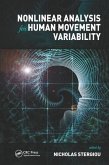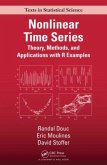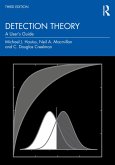Additional Resource Materials
Human behavior would not be interesting to us if it remained the same from one moment to the next. Moreover, we tend to be sensitive to changes in people's behavior, especially when such change impacts on our own, and other's, behavior. This book describes a variety of techniques for investigating change in behavior. It employs conventional time series methods, as well as recently developed methodology using nonlinear dynamics, including chaos, a term that is not easy to define, nor to confirm.
Although nonlinear methods are being used more frequently in psychology, a comprehensive coverage of methods, theory and applications, with a particular focus on human behavior, is needed. Between these covers, the reader is led through various procedures for linear and nonlinear time series analysis, including some novel procedures that allow subtle temporal aspects of human cognition to be detected. Analyses of reaction times, heart-rate, psychomotor skill, decision making, and EEG are supplemented by a contemporary review of recent dynamical research in developmental psychology, psychopathology, and human cognitive processes. A consideration of nonlinear dynamics assists our understanding of deep issues such as: Why is our short-term memory capacity limited? Why do chronic disorders, and also cognitive development, progress through stage-like transitions? Why do people make irrational decisions?
This book will be of particular interest to researchers, practitioners, and advanced students in a variety of areas in psychology, particularly in human experimental and physiological psychology. Data analyses are performed using the latest nonlinear dynamics computer packages. A comprehensive WWW resource of software and supplementary information is provided to assist the reader's understanding of the novel, and potentially revolutionary, procedures described in the book.
Human behavior would not be interesting to us if it remained the same from one moment to the next. Moreover, we tend to be sensitive to changes in people's behavior, especially when such change impacts on our own, and other's, behavior. This book describes a variety of techniques for investigating change in behavior. It employs conventional time series methods, as well as recently developed methodology using nonlinear dynamics, including chaos, a term that is not easy to define, nor to confirm.
Although nonlinear methods are being used more frequently in psychology, a comprehensive coverage of methods, theory and applications, with a particular focus on human behavior, is needed. Between these covers, the reader is led through various procedures for linear and nonlinear time series analysis, including some novel procedures that allow subtle temporal aspects of human cognition to be detected. Analyses of reaction times, heart-rate, psychomotor skill, decision making, and EEG are supplemented by a contemporary review of recent dynamical research in developmental psychology, psychopathology, and human cognitive processes. A consideration of nonlinear dynamics assists our understanding of deep issues such as: Why is our short-term memory capacity limited? Why do chronic disorders, and also cognitive development, progress through stage-like transitions? Why do people make irrational decisions?
This book will be of particular interest to researchers, practitioners, and advanced students in a variety of areas in psychology, particularly in human experimental and physiological psychology. Data analyses are performed using the latest nonlinear dynamics computer packages. A comprehensive WWW resource of software and supplementary information is provided to assist the reader's understanding of the novel, and potentially revolutionary, procedures described in the book.
"...researchers have at their disposal an accessible, thorough and comprehensive handbook of nonlinear dynamical systems methods, specifically oriented towards applications in psychology....Heath surveys all of the most important areas being applied in current research. The range is truly impressive, as is the adherence to examples based either on real psychological experiments or on simulations motivated by psychological questions....Heath has done the psychology community an inestimable service. This book should be on the reference shelf of every practicing researcher, not just in psychology but in the social sciences as well. I also think that it should be required reading for any advanced course in quantitative methods, particularly at the graduate level."
Journal of Society for Chaos Theory
Journal of Society for Chaos Theory
"...researchers have at their disposal an accessible, thorough and comprehensive handbook of nonlinear dynamical systems methods, specifically oriented towards applications in psychology....Heath surveys all of the most important areas being applied in current research. The range is truly impressive, as is the adherence to examples based either on real psychological experiments or on simulations motivated by psychological questions....Heath has done the psychology community an inestimable service. This book should be on the reference shelf of every practicing researcher, not just in psychology but in the social sciences as well. I also think that it should be required reading for any advanced course in quantitative methods, particularly at the graduate level."
Journal of Society for Chaos Theory
Journal of Society for Chaos Theory








